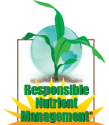from the desk of john dobberstein Could ‘Sociology’ Bring Local Answers to Weed Problems?
It might not seem “sociology” — the study of groups of people — would have anything to do with fighting herbicide resistance. But Katie Dentzman has a different idea.
feature Understanding Soil Tests for Determining No-Till Nutrient Needs
Founder of Ward Labs in Kearney, Neb., Ray Ward answers some questions about soil testing, carbon sequestration and nutrient cycling.
podcast Unlocking the Power of Soil with DNA Testing
For this episode of the No-Till Farmer podcast, brought to you by Pivot Bio, we're joined by Trace Genomics co-founder, Poornima Parameswaran, who explains what Trace Genomics’ soil DNA test is able to analyze and how it can help farmers and agronomists target inputs and better understand the variables that affect crop health and yields.
Nominate Accepting Nominations: Responsible Nutrient Management Program
Do you feel you are taking a responsible approach to nutrient management on your farm? Or do you know a no-tiller who takes an efficient, environmentally sound view of fertilizer application? If so, we're encouraging you to nominate yourself or a deserving no-tiller to be considered to receive the Responsible Nutrient Management Practitioners award. The 13th annual program will recognize the respected fertility practices of three no-tillers during the National No-Tillage Conference in Indianapolis, Ind., on Jan. 13, 2021. All three recipients will receive free travel and hotel accommodations courtesy of AgroLiquid, as well as free registration from No-Till Farmer to attend the 29th annual no-till educational event from Jan. 12-15, 2021. Nominate a grower here »
no-till news Grain Sorghum Yield Potential: Understanding the Main Yield Components
Kansas State University Extension shares some of the main components that drive sorghum yield to help no-tillers best estimate yield potential.
Wheat Planting: Tips for Good Stand Establishment
Regardless of the soil moisture conditions at wheat planting time, there are a few important steps producers can take to improve their chances of getting a good stand of wheat, says Kansas State University Extension.














